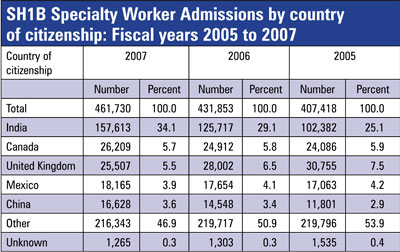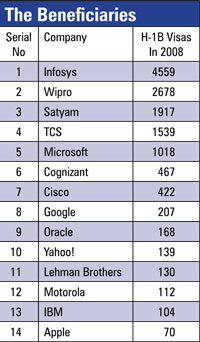Criticism against the H-1B visa program is mounting with easy passing day with increasing job losses in the US. Will Indian companies, IT sector particularly, be able to whether the storm as they were the chief beneficiary of the program?
November 4th, 2008, will forever be remembered as a historic date, as it was the day a black man (Barrack Obama) was elected as the 44th President of the United States. His victory against all odds was wildly celebrated not only across towns and cities in the US but also across the globe. Thousands of people across different continents were seen cheering and celebrating Obama’s election to lead US for the next 4 years. But back here in India, there was muted scepticism for the new president. Though overtly, there were congratulatory messages being exchanged and right noises being made, deep down inside there was a niggling fear of Obama as a policy maker and Democrats in large.
The trepidation was not without reason, the world at large and the US specifically is facing one of the biggest economic challenges in the past few decades. Prompted by the Sub-prime crisis, the US economy has been going down, and going down fast. With factories shutting down and jobs being retrenched, Obama promised a policy that was a complete anti-thesis of the Republican pro- business line. He talked about pumping money in the economy and more importantly ensuring that Americans did not lose their jobs to migrant workers (read Indians). In fact, he had even spoken against the H-1B Visa program, wherein companies were allowed to bring in specialist workers for some 6 odd years in the US.
business line. He talked about pumping money in the economy and more importantly ensuring that Americans did not lose their jobs to migrant workers (read Indians). In fact, he had even spoken against the H-1B Visa program, wherein companies were allowed to bring in specialist workers for some 6 odd years in the US.
The main beneficiary of the H-1B Visa program were Indian tech companies, namely, TCS, Wipro, Infosys, likes that sent their workers in the US on deputation. Using H-1B Indian IT companies could offer a range of outsourcing services to corporations across the US. But as the job losses seem to be at historic high in the US, the shrill against the H-1B program is growing stronger by the day. In fact, the latest data released by the US immigration authorities, shows that Indian IT majors received the maximum number of H-1B work permits in 2008 (see table). It is certainly not a new trend as Indian IT majors had dominated the list of H-1B recipient list last year as well. Last year 163,000 immigrant workers applied for 65,000 slots. These figures are being used by the critics of H-1B program, ranting against the dominance of Indian IT firms.
The Noose tigthens
Protectionism is indeed on the rise in the US. There are numerous senators who are lobbying hard to have the H-1B program be scrapped or have severe restrictions imposed. Not surprisingly, last month, when President Obama presented the $787 billion federal stimulus bill to the US Congress, he spoke about how restrictions would be imposed on H-1B use by financial-services firms that receive bailout funds. On the other hand pressure is also rising on the US MNCs asking them not to employ H-1B workers, for instance, Senator Chuck Grassley sent letters to Microsoft mentioning that the company had “a moral obligation” to put the jobs of US citizens ahead of H-1B immigrant workers amidst layoffs.
There was also much hue and cry among the Indian community in the US over the three-month deadline to leave the US for H-1B visa holders who have lost their jobs. U.S.-based organisations of Indians have asked for an extension of the deadline as a falling market it is difficult for returnees to sell their assets and settle their affairs.
Back in India, the response has been much refrained. While quite a few politicians have decried against any sort of protectionism, not much has been forthcoming from the IT sector. Nasscom for its part expressed ‘serious concern’ at the turn of things. Government officials in India are lobbying with the US government to work out an amicable solution to the issue.
Likely Impact?
So, how bad is the news for India and Indian companies in particular; is the big question that is on everybody’s mind right now. There is a body of thought, that in order to stay competitive companies in the US will have to looks at ways and means of increasing productivity while at the same time cut costs and hence they cannot do away with outsourcing all together. It is simple economics and no amount of politics can really score over it. Also, the fact remains that in spite of his Democratic antecedents, the Clintons (former president Bill Clinton and current secretary of state Hillary Clinton) have been supporters of the H-1B program. In fact, the wind seems to be still blowing in favour of the H-1B program, as Obama chose Senator Judd Gregg as the Secretary of Commerce. Gregg had in the past stood out in the Senate in strong favour for expanding the cap on H-1B visas from the current 65,000 per year.
In the meantime, companies and job seekers are again gearing up for applying for the H-1B visas that will become available in financial year 2010, which begins in October. The USCIS will receive application for the 65,000 visas on April 1. Business icons like Eric Shmidt (Google) and Bill Gates (Microsoft) are known proponents of the H-1B program. Thus, there is the likelihood that all the words might not really translate into action, and Indian companies might continue to benefit like they have done in the past.
In the end, it all boil down to the economics, if the crisis worsens and there are more job cuts and losses in the US, the opposition against outsourcing in general and H-1B in particular will increase by manifold. Banks and financial institutions that have been bailed out by the US treasury will be under enormous pressure to hire American citizens over immigrants. With a bevy of banks being funded by the US government, this is certainly not a great scenario. Also, if perchance the massive bailout fails to enthuse the economy President Obama will be coerced into adopting more radical means of kick-starting the US economy.
On the other hand, if in the next few quarters the pall of gloom lifts and there is an improvement on the ground in terms of the US economy, the tirade against the outsourcing will lessen. Indian companies are desperately hoping and praying for the same as their own health is intricately linked with this scenario. The big question is will it happen that way? And what if, it doesn’t?
(This article of mine had been recently published in Dataquest)
